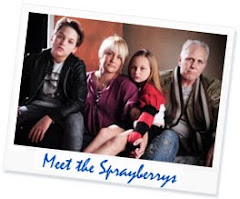 Saying goodbye to Texas was as difficult as making the journey to Hollywood was exciting.
Saying goodbye to Texas was as difficult as making the journey to Hollywood was exciting.When we arrived on February 1st, 2006 we initially were thinking that a trial month during pilot season would be a good way to get our feet wet. Within a week we decided to push that "month" all the way to June. Two years later...well, let's just say we never went back to Texas.
Our family embraces the philosophy that you're either in it full-time or you're not in it. Basically, for us, there's no half-way.
As is the case with many families that leave their hometowns in an effort to follow their dreams, the move was risky - a leap of faith if you will - because we did not have representation waiting for us in Hollywood. If you're lucky enough to find representation and then move to Los Angeles, the move may be just a bit easier on you. However, I wouldn't say that it is the only way to go. Sometimes in life there comes a time when the risk to remain in your comfort zone is more painful than the risk it takes to follow your destiny. This, we believed, was our destiny and if you believe it is yours, go for it or you may always wonder "what if?"
It wasn't until late May that we finally connected with management and agent representation.
The time period from February 1st through May was not an overly affirming time for us, however, we had faith and today we are fortunate to be with a dynamic manager and agencies that truly represent us well - they are outstanding!
Initially my wife Dana was in Houston - commuting back and forth when possible and managing her own company. Dealing with this separation was the hardest part for me and the children. Many times I'd say, "Dana, this is bigger than us and we must sacrifice temporarily. We're strong; we can do this."
For 15 months Dana continued to work in Houston while the kids and I continued our journey without a present wife and mother. Fortunately she was able to fly out once a month - without her visits, we would not have made it.
Emotionally we knew what we were managing. More importantly, we were always on the same page and extremely supportive of one another. We faced many moments of truth, yet we always worked through our challenges and, for the most part, managed to make the right steps.
If you're at this stage of the game, my advice to you is as follows:
- Come here financially prepared.
- Find and surround your family with sincere and grounded friends
- If at all possible, come with representation. This does indeed make the path more fun and, of course, easier.
- Be resourceful: utilize companies like Children In Film, talk with successful child-actor parents and listen to their stories and recommendations.
- Coaches, classes, photographers, etc. are all here in LA.
- This, like many things in life, is a process of growth. Don't forget that. You'll live and learn.
- Don't be shy in taking risks and most of all, follow your instincts and listen to your children.
Like many who came to Hollywood before us and many who will come after, we walk a stressful path: money concerns, family separation, traffic, school, a new environment. The list goes on and on. But at the end of the day, we're happy with where we are and where we are going.
~CS




.jpg)

